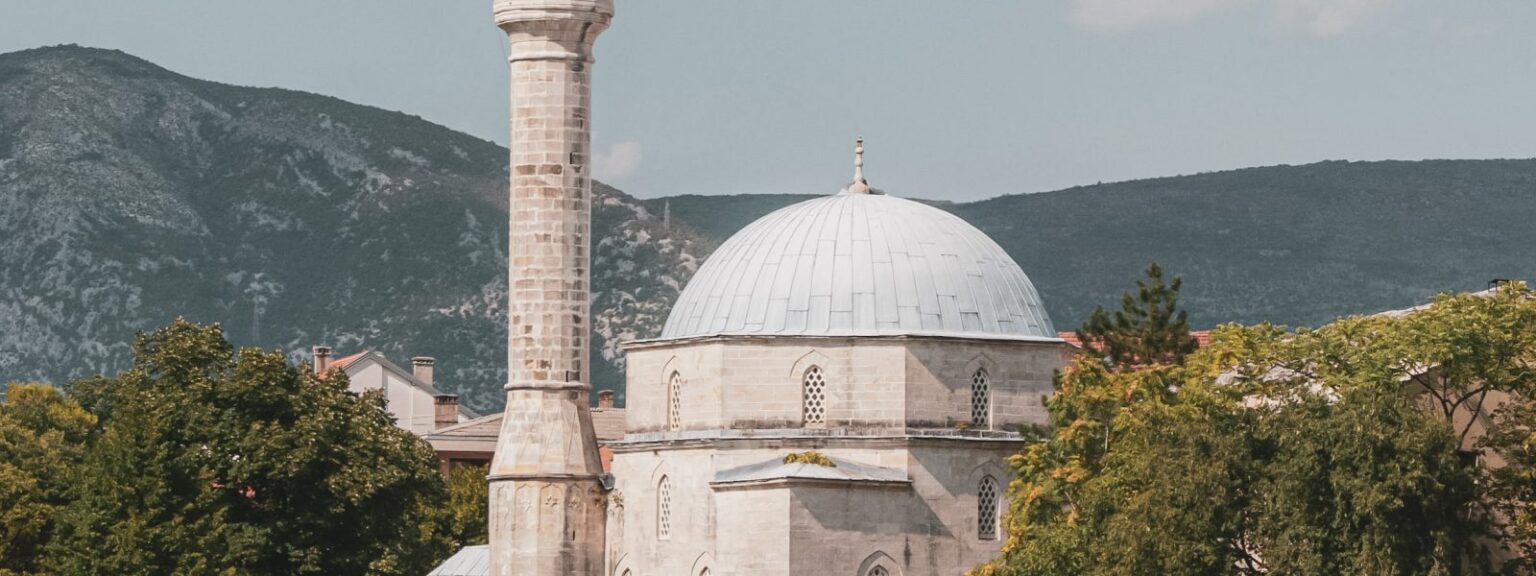“The likeness of the believers in their mutual love, mercy and compassion is that of the body; when one part of it is in pain, the rest of the body joins it in restlessness and fever.”1
The fever (الْحُمَّى) speaks to the pain that we feel and is what heats the body. The restlessness (السَّهَرِ) is what keeps it awake in response to that pain and heat. If the sweetness of faith is only experienced through loving one for Allah’s sake alone,2 the opposite is to not feel any emotion at all for those you should intensely love for Allah. As Ibn Taymiyyah (ra) mentions, this narration mandates that one “feel joy with the joy of the believers, and sadness with what saddens them. And whoever does not feel for them is not one of them.”3 More so than any teacher I’ve ever had, I saw this pain and restlessness in the tears and tahajjud of my mother, and still find it in her poetry.
“The Umma” is a term that evokes varied sentiments. On paper, it refers to every Muslim across the world regardless of ethnicity, geography, and even religiosity. Practically however, it’s likely to primarily encompass the parts of the Umma from a common cultural background or shared experience. Any Muslim who has grown up in the Masajid has repeatedly heard of causes far and wide that they should care for in the name of love for the Umma, yet the priority would naturally be given to what feels closest in proximity. As the causes grow in number, the possibility of action and meaningful connection to any single one of them disintegrates. What transpires in the aftermath of that is either guilt or indifference, and possibly some donations, but very little concerted action.
At the heart of the moral charge of Dr. Anjum’s provocative essay Who Wants the Caliphate? (2019), preceding the intellectual struggle to reimagine our failing political structures, is as he puts it, “a call for young Muslims everywhere to link up with each other across artificial borders and ask themselves practical, moral questions: how can we respond better to the loss of faith and devotion to God, the apathy and corruption of the elite, lift up the dispossessed refugees, aid our persecuted brethren in faith, facilitate economic collaboration, alter political institutions, improve religious discourse, enrich dialogue and discourse with Muslims within and across sectarian and national boundaries, and improve education and communication across the many barriers of distance, language, and prejudice?”4
Breaking through these artificial borders means acquainting ourselves with the experiences of Muslims who share nothing in common with us beyond their faith and humanity, and consequently representing them proportionally in our agendas. One of the things we love so much about our Prophet (saw) is that he loved all of us, despite any gaps in time, culture, or circumstance between us. He saw the light of his message spreading to parts of the world that he would never get to physically travel to, and empathized with the pain of holding on to that message with evolving unique challenges to the latter Muslims dwelling in a world that becomes increasingly difficult to practice meaningful faith in. That recognition and concern of the Prophet (saw) was taken into consideration by him in his means of communication, his loving supplication, his establishment of a community designed to pass the faith on with clarity, and his reassurances to us of victory and eternal bliss should we remain steadfast. He took us into consideration with his own actions in very meaningful ways, and was even wary of certain voluntary practices being deemed obligatory and becoming a burden on the generations that followed the most righteous generation of the companions who were eager to emulate his every move.
He was sensitive to the recentness of his people coming out of jahiliyya, hence abstaining from something as major as restoring the proper shape of the ka’aba,5 and was sensitive to the level of religious practice of the people that would come long after him causing him to abstain from obligating things that were seemingly minor such as the usage of the siwak6 for every prayer or the delaying of the Isha prayer to a part of the night that may be difficult.7
As the founders of 20th century Islamic movements spoke of the Umma’s revival, they would have certainly struggled to truly grasp what was out of their immediate experience despite their sincere efforts to give life to ummatic concepts in our tradition and exhausting the limited means of communication available to them in their times. Naturally, a thinker in the Arab world would primarily conceive of Arab-centric solutions and be primarily deeply familiar with problems that may or may not be unique to Arab Muslims unless they were very well traveled. The same would be true of a revivalist in India, Turkey, or Mali. That isn’t a flaw on their part, and it may be that due to the sincerity of their striving and blessing that Allah may have bestowed on their work that they were guided to think and act in ways that actually did end up grasping many experiences they were otherwise unfamiliar with. But in our era, we have been granted exposure to so much of what they wouldn’t have been able to observe through the ease of travel and technology. And an ummatic thinker should broaden their experience with the Umma around the world to encompass them in their writings and efforts.
Another layer of this has been the recent presence of Muslim populations thriving in the West. When Islamic revivalists of the East spoke of the West, they mainly spoke of it as an entirely hostile entity with incongruous values that were only interested in colonizing the Muslims, both in terms of territory and thought. While much of their critique would certainly still hold weight, especially in regard to foreign policy, what then of the Muslims who have settled in the West with Islam now passing through successive generations and developing institutional maturity? How do we shift the ummatic discourse to now not merely speak about the West as an object of confrontation, but where Muslims have lived, have generational experiences, have unique circumstances that would differentiate them even amongst themselves, and are positioned to influence the global discourse on Islam, the Muslim Umma, and the future of humanity as a whole?
A personal experience which deeply moved me as of late was a trip I was blessed to take to Bosnia. And what could be more ummatic than a genocide tribunal regarding Kashmir, in Sarajevo, with a Palestinian-American on the panel?8 I grew up with Bosnia as a central cause to my conscience. My family hosted refugees. My mother wrote poetry about it. But nothing is like going to Srebrenica and smelling the freshness of the genocide. With that being said, of the most telling encounters was my meeting with the foreign minister, Dr. Bisera Turkovic. When I asked her what an American Muslim with a platform like myself could do to help their cause, offering her to come back to Sarajevo frequently. She responded: “we need you in St. Louis more than Sarajevo!” I was stunned when she went on to say that there are over 100,000 Bosnians there, and as the American public moves on from Bosnia to other causes, I needed to connect with them and see how we could keep it front and center.
Despite the closeness of St. Louis to me in Texas, I wouldn’t have known that without going as far as Bosnia to hear that first-hand. And now I bear the burden of knowing not just of that plight, but a concrete way to involve its people. To speak of the Umma’s needs as a singular entity, one must properly do an assessment of those needs across the board.
Dr. Anjum rightly notes, “This order, consisting of nation-states interested in their own self-preservation as well as the logics of neoliberal capital, has failed the people of Kashmir, as it has failed the people of other occupied, colonized, or oppressed regions around the world, including the Palestinians, Uighurs, Yemenis, Afghans, Rohingya, and more. Not only has this order remained silent in the face of oppression, but it has also actively abetted such violence through arms and defense deals, trade agreements, and mechanisms of soft power.”9
We must remember that our obstacles towards the upliftment of this Umma are both internal and external, but almost all interconnected through global structures of exploitation that see Muslims as convenient sacrifices. Humanizing the oppressed Muslim is essential not just to the Non-Muslim, but to other Muslims who are on the other side of those borders that feel relative safety and privilege. Combating the figures and structures that oppress them includes the ones that do so with the shroud of Islam. And to truly weigh in on the Umma as an entity, one must make every effort to experience it fully and faithfully.
Notes
- https://sunnah.com/bukhari:6011
- https://sunnah.com/bukhari:16
- ولهذا كان المؤمن يسره ما يسر المؤمنين ويسوءه ما يسوؤهم ومن لم يكن كذلك لم يكن منهممجموع الفتاوى 2/373
- https://yaqeeninstitute.org/read/paper/who-wants-the-caliphate
- https://sunnah.com/bukhari:1583
- https://sunnah.com/bukhari:887
- https://sunnah.com/ibnmajah:690
- https://www.justiceforallcanada.org/blog/russell_tribunal_december_kashmir_omar_suleiman_jammu_kashmir_2021_12_07
- https://yaqeeninstitute.org/read/paper/who-wants-the-caliphate




